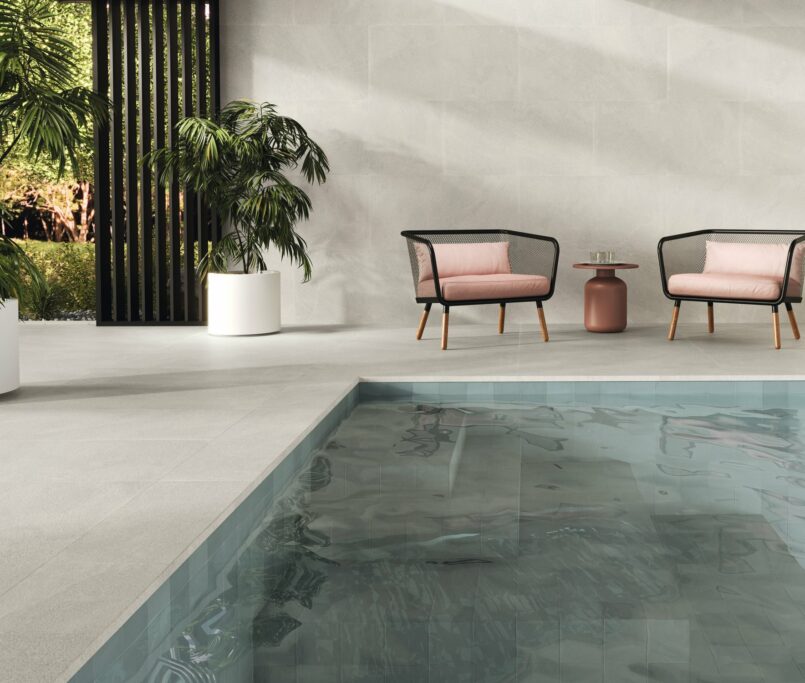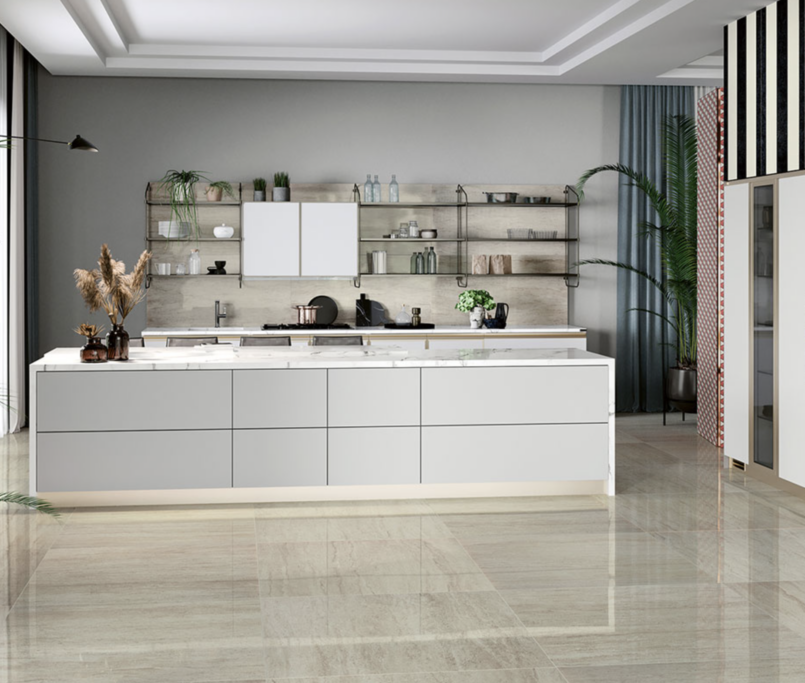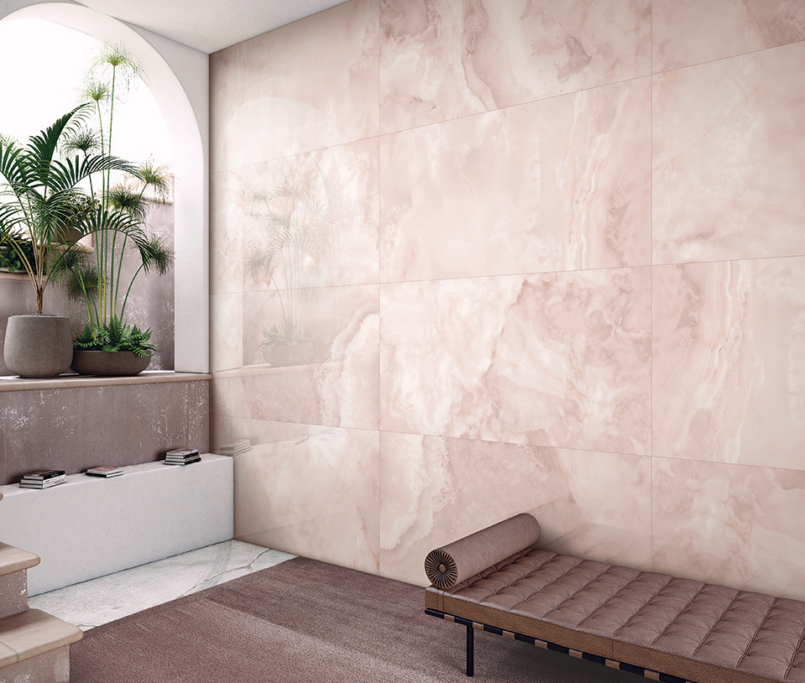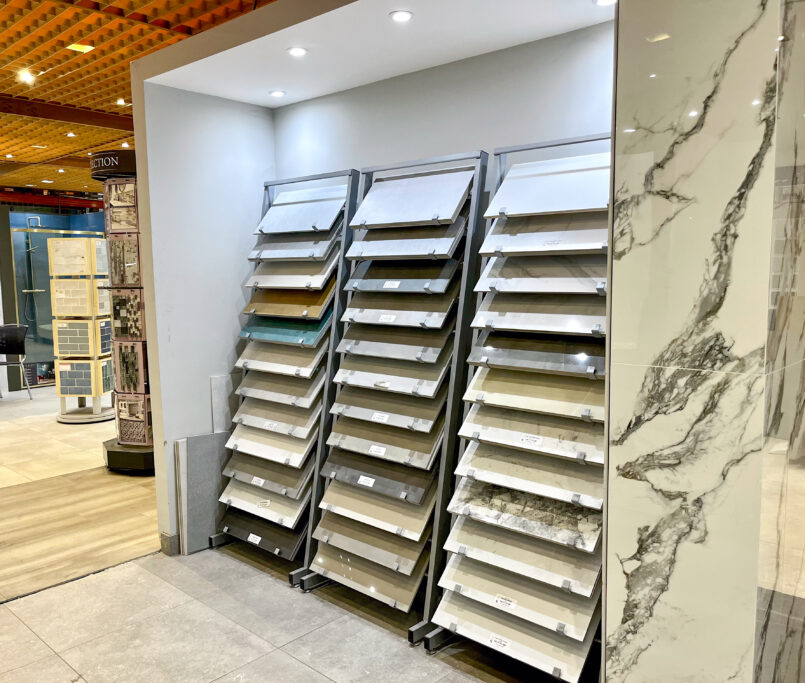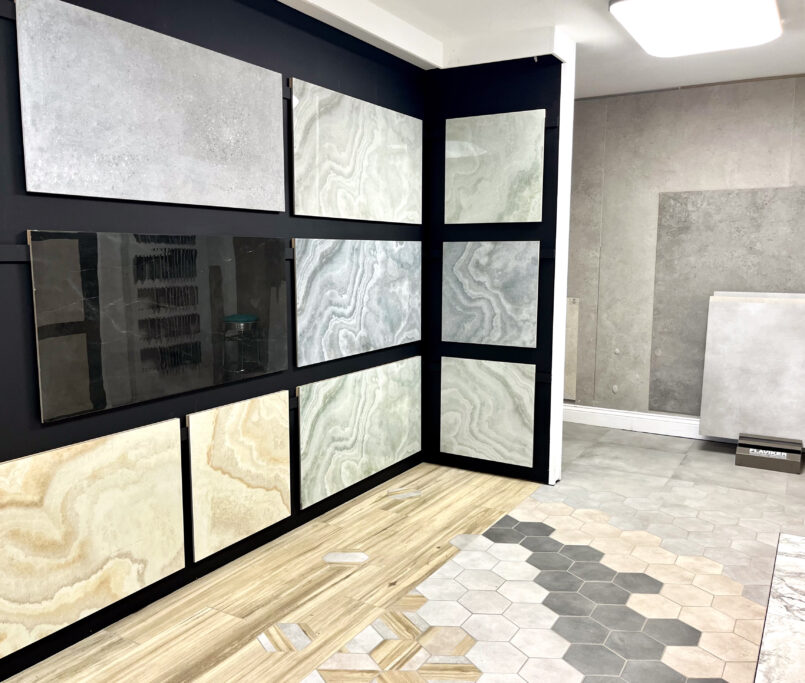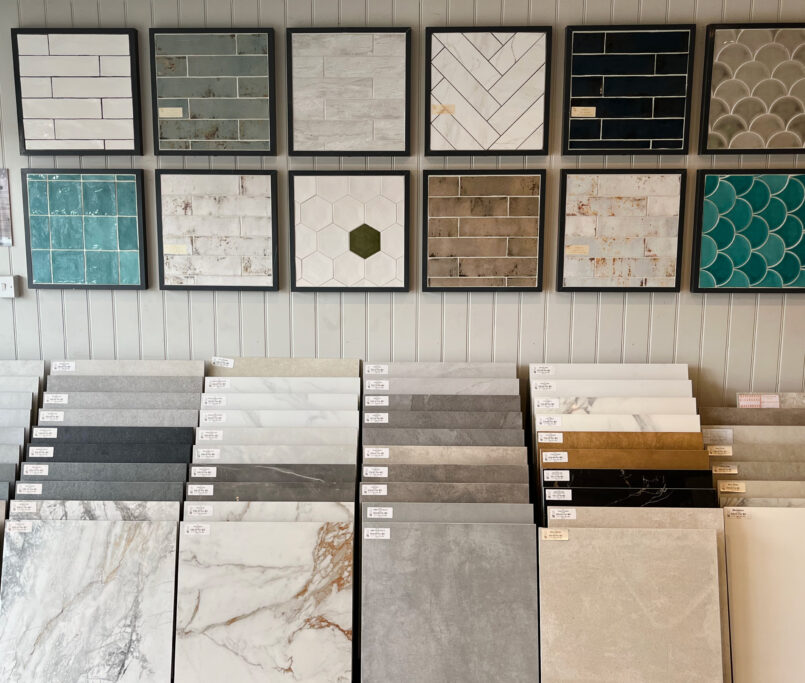
Porcelain tiles are generally considered to be better than ceramic tiles in terms of durability and resistance to wear and tear. They are also less porous, making them more resistant to water and stains.
Additionally, porcelain tiles are often available in larger sizes and a wider range of colours and styles compared to ceramic tiles. However, ceramic tiles can be less expensive and easier to install, making them a popular choice for certain projects.
Ultimately, the choice between porcelain and ceramic tiles depends on individual preferences and project requirements.
There could be several reasons why some porcelain tiles are cheap:
1. Lower quality materials: The tiles may be made from lower quality materials, which can affect their durability and longevity.
2. Mass production: The tiles may be produced on a large scale, which can lower the cost per unit.
3. Simple designs: The tiles may have simple or basic designs that require less effort and resources to produce.
4. Overseas production: The tiles may be produced in countries with lower labor and production costs, resulting in cheaper prices.
5. Clearance sales: The tiles may be on clearance or sale due to overstock or discontinued lines, resulting in lower prices.
Porcelain tiles are known for their durability and can last for several decades or even a lifetime if properly installed and maintained. With proper care and maintenance, porcelain tiles can last indefinitely.
It is subjective to determine which country makes the best porcelain tiles as it depends on various factors such as the quality of raw materials, manufacturing processes, and design preferences.
However, some countries known for producing high-quality porcelain tiles include Italy, Spain, China, and Turkey.
Porcelain tiles can be heavy, but they are suitable for use on walls as long as the wall structure can support the weight.
It is important to ensure that the wall is properly prepared and reinforced before installing porcelain tiles to avoid any potential issues.
Bigger tiles can be easier to install in some cases because they cover more surface area and require fewer individual pieces to lay. However, they can also be more difficult to handle and manoeuvre during the installation process due to their weight and size.
Additionally, the size of the tile should be chosen based on the specific space it will be installed in and the design aesthetic desired. So, the ease of installation also depends on the skill and experience of the person doing the installation.
Yes, you can put large tiles on your walls as long as the walls are properly prepared and able to support the weight of the tiles. It is important to follow the manufacturer’s instructions and use the appropriate adhesive and installation techniques for large tiles.
It is recommended to consult with a professional installer or contractor for best results.
It is generally recommended to add an extra 10-15% for wastage when ordering tiles. This will account for any cutting or breakage that may occur during installation, and ensure that you have enough tiles to complete the project without having to order additional tiles later.
Porcelain tiles are typically less porous and more resistant to moisture than other types of tiles, such as ceramic or natural stone. This makes them more durable and less prone to staining or water damage.
However, sealing porcelain tiles can still be beneficial in certain cases.
Porcelain tiles are not necessarily harder to install than other types of tiles, but they do have some unique characteristics that may require additional care or specialised tools during installation.
Grout is typically used when installing porcelain tiles, as it helps to fill the gaps between the tiles and provides a finished, cohesive appearance. Grout also helps to stabilise the tiles, preventing them from shifting or moving over time.
Additionally, grout can help prevent water and debris from getting beneath the tiles, which can lead to damage or mold growth.
Yes, porcelain tiles are an excellent choice for shower installations due to their durability, low porosity, and resistance to water and stains.
The best type of tile for your flooring depends on several factors, including the area where the tiles will be installed, your aesthetic preferences, budget, and specific needs.
You can choose between Porcelain, Natural Stone, Ceramic or Luxury Vinyl Tiles.
Porcelain tiles are generally more expensive than ceramic tiles due to several factors related to their manufacturing process, composition, and overall quality.
Porcelain tiles, like other types of tiles, can feel cold underfoot because they are good conductors of heat and have low insulating properties.
This means that they quickly transfer heat away from your feet, creating a sensation of coldness when you walk on them. If the room temperature is cool, the tiles may feel even colder.
Porcelain tiles can be slippery, especially when wet, which can be a concern in areas such as bathrooms, kitchens, or outdoor spaces. There are several ways to make porcelain tiles less slippery and improve their safety.
You could make sure you purchase Anti Slip Porcelain Tiles or apply an Anti Slip Coating to the tiles after they have been installed.
Porcelain tiles, like other hard flooring materials, can feel firm and solid underfoot, which may feel less comfortable compared to softer flooring options like carpet or cork.
However, whether porcelain tiles are considered hard to walk on largely depends on personal preferences and specific needs.
Porcelain tiles are known for their durability and hardness, making them less prone to chipping compared to other types of tiles, such as ceramic tiles.
Porcelain tiles are made from a dense, fine-grained clay and fired at high temperatures, resulting in a strong, low-porosity, and wear-resistant material.
While porcelain tiles are generally considered more expensive than ceramic tiles, you may come across some porcelain tiles that are relatively cheap.
The price of porcelain tiles can vary due to several factors, including: Quality, Design, Brand.
Also if the tile is overstocked or discontinued they seller may have applied a favourable discount in order to move the stock.
Yes, porcelain tiles are typically waterproof. This is because they are made from a dense and non-porous material that does not absorb water.
As a result, porcelain tiles are often used in areas that are prone to moisture, such as bathrooms, kitchens, and outdoor patios.
However, it is important to note that the grout used to install porcelain tiles may not be waterproof, so it is important to ensure proper sealing and maintenance to prevent water damage.
The weight of porcelain tiles varies depending on the size and thickness of the tile. Generally, a 30x30cm porcelain tile weighs around 2.5 kg, while a 60x60cm porcelain tile can weigh up to 9 KG or more. Meaning 1m2 at 10mm thick would weigh around 25kg.
A Matt Porcelain tile cannot be polished because it has a matte finish that is intentionally designed to be non-reflective and non-slippery. Attempting to polish it may damage the surface and alter its texture.
Porcelain tiles can vary in slip resistance depending on their surface texture and finish. Some porcelain tiles are specifically designed to be slip-resistant, while others may be more slippery when wet. It is important to check the tile’s slip resistance rating before selecting it for a particular space, especially in areas where water or moisture is present, such as bathrooms or kitchens.
Porcelain tiles are generally heat resistant, but the degree of resistance can vary depending on the manufacturer and the specific type of porcelain tile.
It is important to check the manufacturer’s specifications and recommendations before exposing porcelain tiles to high temperatures.
In general, porcelain tiles can withstand moderate heat and are often used in kitchen backsplashes and fireplace surrounds.
However, it is not recommended to use porcelain tiles as a surface for hot pots or pans directly from the stove or oven.
Porcelain tiles are highly resistant to staining due to their non-porous nature. However, if left uncleaned for a long time, certain substances like oil or acidic liquids can cause stains on the surface.
It is important to clean up spills and stains as soon as possible to prevent any permanent damage to the tiles.
Porcelain tiles can feel cold to the touch, especially if they are installed in a room with low temperatures or if they have been exposed to cold air or water.
However, porcelain tiles are a good conductor of heat, which means they can also feel cool in warmer temperatures.
It is recommended to use rugs or heating systems to keep the floor warm during colder months
Porcelain tiles are highly resistant to fading in sunlight due to their composition and manufacturing process.
They are made of a blend of fine-grain clays and other natural materials, which are fired at very high temperatures to create a dense and durable material.
This process makes them highly resistant to UV rays and fading. However, prolonged exposure to direct sunlight may cause some slight colour variations over time, especially in darker coloured tiles.
Yes, a porcelain tile can crack under certain circumstances such as excessive weight or impact, improper installation, or structural movement.
However, porcelain tiles are known for their durability and resistance to scratches, stains, and moisture, making them a popular choice for high-traffic areas in residential and commercial properties.
Proper care and maintenance can also help prevent cracking and prolong the lifespan of porcelain tiles.
Porcelain tiles are generally known to be resistant to temperature changes and are less likely to crack in the cold compared to other types of tiles.
However, extreme temperature fluctuations, such as sudden drops in temperature or exposure to freezing temperatures, can cause any type of tile, including porcelain, to crack.
It is recommended to use a high-quality porcelain tile and ensure proper installation to minimise the risk of cracking
Porcelain tiles are generally scratch-resistant, but they can still be scratched by hard or sharp objects. However, the likelihood of scratches depends on the quality of the tile, its finish, and the level of foot traffic or usage it receives.
It is important to clean porcelain tiles regularly and avoid dragging heavy or sharp objects over them to minimise the risk of scratches.
Porcelain tiles, like other types of flooring materials, can get warm in the summer, particularly when they are exposed to direct sunlight or installed in outdoor areas.
The degree to which porcelain tiles heat up will depend on factors such as the tile colour, location, and amount of sunlight exposure.
Both porcelain and ceramic tiles can be suitable for kitchen floors, but each type has its own advantages and disadvantages.
Porcelain tiles are known for their durability, hardness, and resistance to scratches, making them an excellent flooring option for homes with pets, including dogs.
While it is unlikely that your dog’s nails will scratch high-quality porcelain tiles, it is not impossible, particularly if the tiles are poor quality and have a polished or high-gloss finish.
Yes, porcelain tiles can be used on walls. They are a durable and versatile option for both floors and walls, as they are resistant to water, stains, and scratches.
Porcelain tiles come in a variety of colours, patterns, and finishes, making them a popular choice for bathrooms, kitchens, and other areas that require a hard-wearing surface.
Porcelain tiles do not necessarily need sealing because they are already naturally resistant to water and stains.
However, some porcelain tile manufacturers may recommend sealing their products to enhance their durability and longevity.
It is always best to consult the manufacturer’s recommendations and guidelines.
To work out how many tiles you need, follow these steps:
1. Measure the length and width of the area you want to tile.
2. Multiply the length and width to get the total area in square feet or square meters.
3. Determine the size of the tiles you want to use.
4. Divide the total area by the area of one tile (length x width) to get the number of tiles needed.
5. Add 10% to account for any cuts, waste or mistakes during installation.
This should give you the total number of tiles you need to purchase.
Drilling porcelain tiles can be a difficult task, but it can be done with the right tools and techniques. Here are some steps to follow:
1. Choose the right drill bit: Use a diamond-tipped drill bit specifically designed for drilling through porcelain tiles.
2. Mark the spot: Use a pencil to mark the spot where you want to drill the tile.
3. Secure the tile: Use a clamp or a piece of tape to secure the tile in place and prevent it from moving while you drill.
4. Start drilling: Start drilling slowly at a low speed, gradually increasing the speed as you go. Use a spray bottle to keep the drill bit cool and lubricated with water.
5. Apply light pressure: Apply light pressure to
For installing porcelain tiles, a high-quality, polymer-modified adhesive is recommended. This type of adhesive is specially designed to bond well with porcelain tiles and provide a strong and durable bond.
To clean porcelain tiles, follow these steps:
1. Sweep or vacuum the floor to remove any loose dirt or debris.
2. Mix a solution of warm water and mild detergent.
3. Using a mop or soft cloth, wipe down the floor with the solution, making sure to wring out excess water to avoid saturating the tiles.
4. For stubborn stains, create a paste of baking soda and water and apply it to the affected area. Let it sit for a few minutes and then scrub gently with a soft-bristled brush.
5. Rinse the floor thoroughly with clean water.
6. Dry the floor with a clean towel or allow it to air dry.
Note: Avoid using abrasive cleaners or tools, as they can scratch.
Most of our products are made from Porcelain and do not need special care or maintenance. If a product requires special attention, we will inform you when you purchase.








